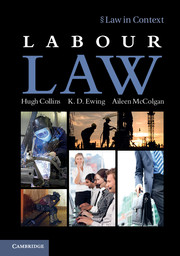Book contents
- Frontmatter
- Contents
- Preface
- Acknowledgments
- Table of cases
- Table of statutes
- Table of statutory instruments
- Table of European Union instruments
- Table of ILO instruments
- Table of other international instruments
- Abbreviations
- Part I Introduction
- Part II The contract of employment
- Part III Statutory regulation of the employment relationship
- Part IV Collective labour rights
- 12 Freedom of association and the right to organise
- 13 Freedom of association and trade union autonomy
- 14 The right to bargain collectively
- 15 The right to be informed and consulted
- 16 Collective action and the right to strike
- 17 Liability for collective action
- Part V Termination of employment
- Index
- References
15 - The right to be informed and consulted
from Part IV - Collective labour rights
- Frontmatter
- Contents
- Preface
- Acknowledgments
- Table of cases
- Table of statutes
- Table of statutory instruments
- Table of European Union instruments
- Table of ILO instruments
- Table of other international instruments
- Abbreviations
- Part I Introduction
- Part II The contract of employment
- Part III Statutory regulation of the employment relationship
- Part IV Collective labour rights
- 12 Freedom of association and the right to organise
- 13 Freedom of association and trade union autonomy
- 14 The right to bargain collectively
- 15 The right to be informed and consulted
- 16 Collective action and the right to strike
- 17 Liability for collective action
- Part V Termination of employment
- Index
- References
Summary
Introduction
In addition to the long-established practice of collective bargaining over pay and related matters, European law has introduced the practice of mandatory information and consultation to the British scene. These information and consultation rights have grown since first introduced to deal with collective redundancies, and now apply to a wide range of decisions by employers. Attempts have also been made to encourage not only ad hoc consultations on specific events, but also the creation of standing and permanent procedures for the exchange of information and consultation on a wide and indeterminate range of issues. Indeed, information and consultation rights not only apply in respect of decisions taken by employers at the national level, but also extend to information and consultation at the transnational level through the medium of European Works Councils.
These information and consultation rights apply in principle to all workplaces over a certain size (which varies according to the matter in question). In practice, however, they are most likely to arise in workplaces where there is a recognised trade union. This is because, in some cases, the trade union enjoys priority status in the sense that, if there is a recognised trade union, it is the union that the employer must inform and consult. This would be true, for example, of the redundancy consultation procedures. In other cases, although the rights in question may be neutral between trade union and non trade union-based arrangements, the role of the trade union will be crucial in providing the initiative to get the procedures established, and to ensure that representatives are properly trained and supported. This would be true, for example, of the European Works Councils.
- Type
- Chapter
- Information
- Labour Law , pp. 593 - 655Publisher: Cambridge University PressPrint publication year: 2012



